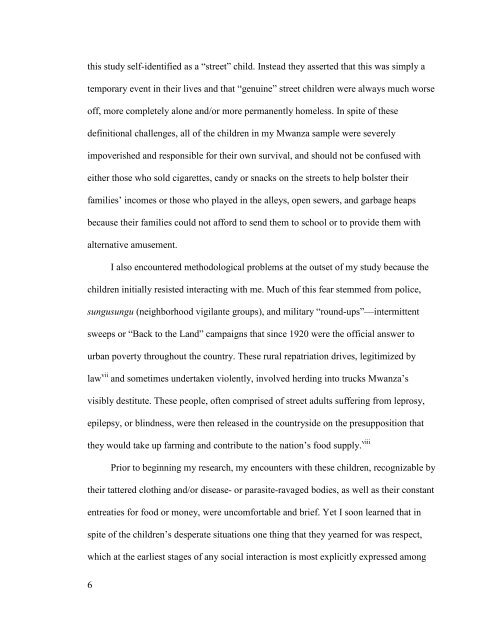You also want an ePaper? Increase the reach of your titles
YUMPU automatically turns print PDFs into web optimized ePapers that Google loves.
this study self-identified as a “street” child. Instead they asserted that this was simply atemporary event in their lives and that “genuine” street children were always much worseoff, more completely alone and/or more permanently homeless. In spite of thesedefinitional challenges, all of the children in my Mwanza sample were severelyimpoverished and responsible for their own survival, and should not be confused witheither those who sold cigarettes, candy or snacks on the streets to help bolster theirfamilies’ incomes or those who played in the alleys, open sewers, and garbage heapsbecause their families could not afford to send them to school or to provide them withalternative amusement.I also encountered methodological problems at the outset of my study because thechildren initially resisted interacting with me. Much of this fear stemmed from police,sungusungu (neighborhood vigilante groups), and military “round-ups”—intermittentsweeps or “Back to the Land” campaigns that since 1920 were the official answer tourban poverty throughout the country. These rural repatriation drives, legitimized bylaw vii and sometimes undertaken violently, involved herding into trucks Mwanza’svisibly destitute. These people, often comprised of street adults suffering from leprosy,epilepsy, or blindness, were then released in the countryside on the presupposition thatthey would take up farming and contribute to the nation’s food supply. viiiPrior to beginning my research, my encounters with these children, recognizable bytheir tattered clothing and/or disease- or parasite-ravaged bodies, as well as their constantentreaties for food or money, were uncomfortable and brief. Yet I soon learned that inspite of the children’s desperate situations one thing that they yearned for was respect,which at the earliest stages of any social interaction is most explicitly expressed among6














